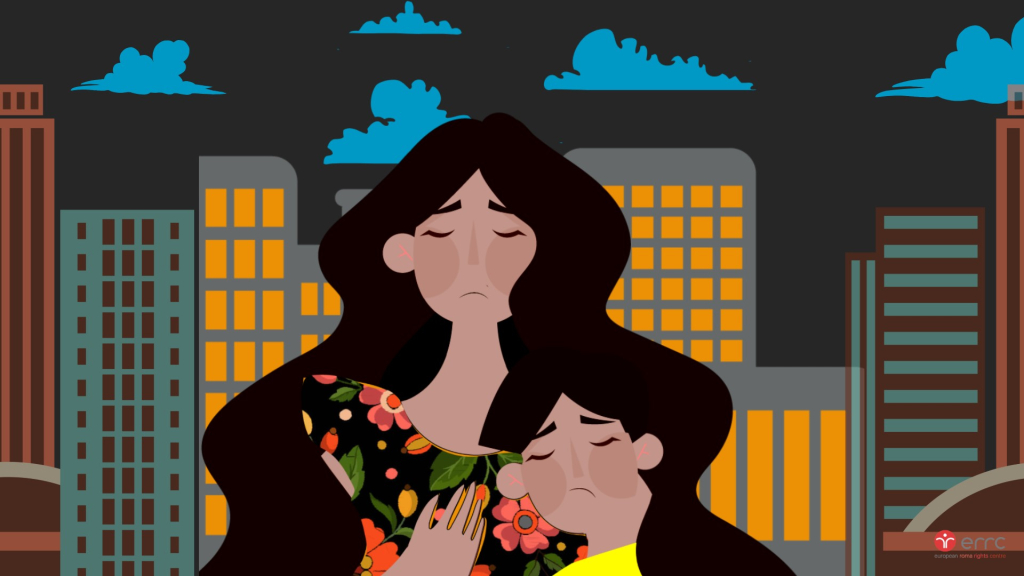Human Rights Report Catalogues Structural Discrimination Against Romani Refugees from Ukraine
17 June 2024

Brussels, 17 June 2024: A new report on the human rights situation of Romani refugees from Ukraine in five receiving countries (the Czech Republic, Hungary, Moldova, Romania, and Slovakia) was released today by the European Roma Rights Centre (ERRC) and details widespread, structural denial of access to basic rights for Roma from Ukraine resident in those countries.
“The last two and half years of displacement has taught Romani refugees, uniquely compared to white refugees from Ukraine, that for Roma it’s a case of same story, different country. The structural issues Romani refugees face in receiving countries are not dissimilar to how Roma are treated across Europe even during peacetime. Denial of equal access to adequate places to live, to equal and non-discriminatory healthcare, to integrated education: these are all issues Roma have to contend with often throughout their lives. It’s been more than two years. These are now long-term structural issues for Romani refugees in these countries. States no longer have the excuse of a sudden war, they must take action to ensure equal access to basic services for all, regardless of their ethnicity” said the ERRC’s President Đorđe Jovanović.
The ERRC’s report is based on the centre’s monitoring and legal teams present in each of the four countries since Russia’s full-scale invasion of Ukraine began in February 2022. Following its previous monitoring exercise which found widespread discrimination against Roma in the weeks and months after the outbreak of full-scale war, many Romani refugees have since emigrated to Western European countries or else been forced to return to Ukraine because of poor treatment. The recent report uncovers the structural barriers that long-term resident Romani refugees now face as the war continues for its second year and these families choose to make a life for themselves in their adopted homes.
Romani refugees face inadequate access to the basic infrastructure of the state in all five of the receiving countries covered in the report. Romani refugees frequently find themselves in sub-standard living conditions in inadequate accommodation, which is frequently ethnically segregated, most notably in the Czech Republic and Moldova. Romani refugees throughout the receiving countries have also been denied apartments by private landlords who openly declare they will not rent to Roma.
Roma from Ukraine are frequently denied access to affordable healthcare under the same conditions as citizens of their respective receiving countries. There is a lack of information on accessing the healthcare system in general, with little provision of targeted support to help children and families access mental health services or women and girls to access basic reproductive healthcare. Many Romani refugees are forced to return to Ukraine in order to access basic healthcare. Often, Roma fear discrimination in healthcare settings and were found to sometimes be summarily denied access to care for arbitrary reasons. In one case, a Romani refugee woman who suffered a miscarriage in Hungary was refused treatment unless she paid a bill of over €1,250, despite being entitled to free maternity care. As the majority of refugees are women, sexual and reproductive healthcare is a key issue, and for Romani women and girls in particular access to this healthcare is often difficult or marred by racism and discrimination throughout the receiving countries.
Access to education remains a difficulty for many Romani refugees whose children do not speak the local language and often have very little support in enrolling in local schools. Poor access to a stable internet connection also hinders access for those who have opted to continue their children’s education online with the Ukrainian school system.
Despite Ukrainian refugees being afforded the right to work in theory across all the receiving countries, scant few Romani refugees have managed to gain employment due to numerous barriers, often stemming from direct and indirect discrimination. While outright discrimination from employers prevents many Roma from getting a job, the greatest barriers are a lack of applicable skills, higher rates of illiteracy, and language barriers. This results in many Roma turning to precarious, informal work where they are exploited for little money to work long hours and where they are open to further risk of discrimination.
Equally, the situation for Roma within Ukraine remains grim. Discrimination in access to services and aid is as common as it ever was, and now an ex-advisor to the Ministry of Internal Affairs has appeared on television to tell those avoiding conscription: “If you're a draft dodger, deliberately ran away, then you have no right to say you're Ukrainian. You're a Gypsy.” For many Roma from marginalised communities, they face a poor choice of which country they would prefer to face discrimination and institutional racism in.
The full report Temporary Protection: The Ongoing Struggles of Romani Refugees from Ukraine is available here in English.
For more information, or to arrange an interview contact:
Jonathan Lee
Advocacy & Communications Director
European Roma Rights Centre
jonathan.lee@errc.org
+32 49 288 7679




